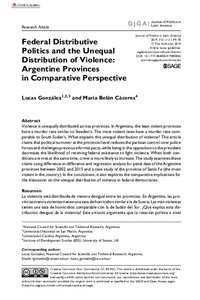Por favor, use este identificador para citar o enlazar este ítem:
https://repositorio.uca.edu.ar/handle/123456789/9855| Título: | Federal distributive politics and the unequal distribution of violence : Argentine provinces in comparative perspective | Autor: | González, Lucas Isaac Cáceres, María Belén |
Palabras clave: | ARGENTINA; VIOLENCIA; FEDERALISMO; HOMICIDIO | Fecha de publicación: | 2019 | Editorial: | SAGE Publications | Cita: | González, L.I, Cáceres, M.B. Federal distributive politics and the unequal distribution of violence : Argentine provinces in comparative perspective [en línea]. Journal of Politics in Latin America. 2019, 11(1). doi:10.1177/1866802X19840465 Disponible en: https://repositorio.uca.edu.ar/handle/123456789/9855 | Resumen: | Abstract: Violence is unequally distributed across provinces. In Argentina, the least violent provinces
have a murder rate similar to Sweden’s. The most violent ones have a murder rate comparable to South Sudan’s. What explains this unequal distribution of violence? This article
claims that political turnover at the provincial level reduces the partisan control over police
forces and challenges previous informal pacts, while being in the opposition to the president
decreases the likelihood of receiving federal assistance to fight violence. When both conditions are met at the same time, crime is more likely to increase. The study examines these
claims using difference-in-difference and regression analysis for panel data of the Argentine
provinces between 2002 and 2015 and a case study of the province of Santa Fe (the most
violent in the country). In the conclusions, it also explores the comparative implications for
the discussion on the unequal distribution of violence in federal democracies. Resumen: La violencia esta´ distribuida de manera desigual entre las provincias. En Argentina, las provincias menos violentas tienen una tasa de homicidios similar a la de Suecia. Las más violentas tienen una tasa de homicidios comparable con la de Suda´n del Sur. ¿Que´ explica esta distribución desigual de la violencia? Este artículo argumenta que la rotación política a nivel provincial reduce el control partidario de las fuerzas policiales y desafía pactos informales Previos, al mismo tiempo que la oposición al presidente reduce la probabilidad de recibir asistenciafederalparacombatirlaviolencia.Cuandoambascondicionessecumplenalmismo tiempo, es más probable que aumente la violencia. El estudio examina este argumento utilizando un análisis de diferencia en diferencia y de regresión para datos de panel de las provincias argentinas entre 2002 y 2015 y un estudio de caso de la provincia de Santa Fe (la ma´s violenta del paı´s). En las conclusiones, tambie´n explora las implicancias comparadas para la discusio´n sobre la distribución desigual de la violencia en democracias federales. |
URI: | https://repositorio.uca.edu.ar/handle/123456789/9855 | ISSN: | 1866-802X (impreso) 1868-4890 (online) |
Disciplina: | CIENCIAS SOCIALES | DOI: | 10.1177/1866802X19840465 | Derechos: | Acceso abierto | Fuente: | Journal of Politics in Latin America. 2019, 11(1) |
| Aparece en las colecciones: | Artículos |
Ficheros en este ítem:
| Fichero | Descripción | Tamaño | Formato | |
|---|---|---|---|---|
| federal-distributive-politics-unequal.pdf | 330,13 kB | Adobe PDF |  Visualizar/Abrir |
Visualizaciones de página(s)
264
comprobado en 18-feb-2026
Descarga(s)
218
comprobado en 18-feb-2026
Google ScholarTM
Ver en Google Scholar
Altmetric
Altmetric
Este ítem está sujeto a una Licencia Creative Commons

